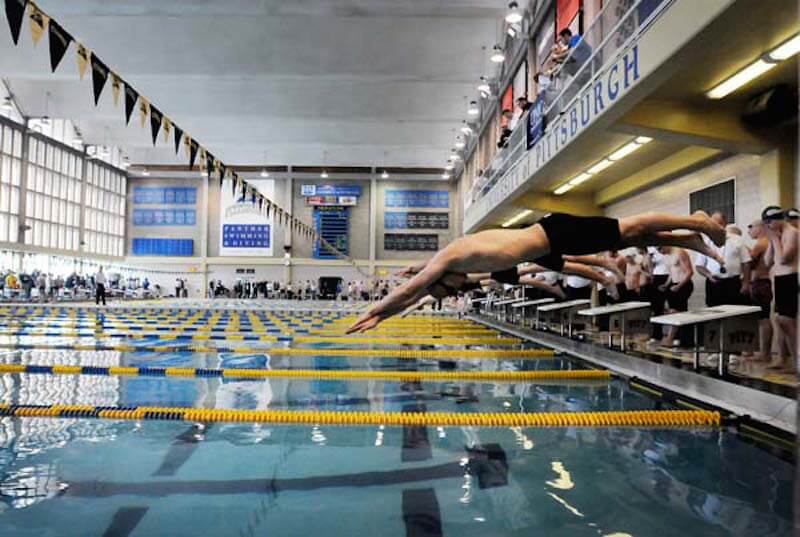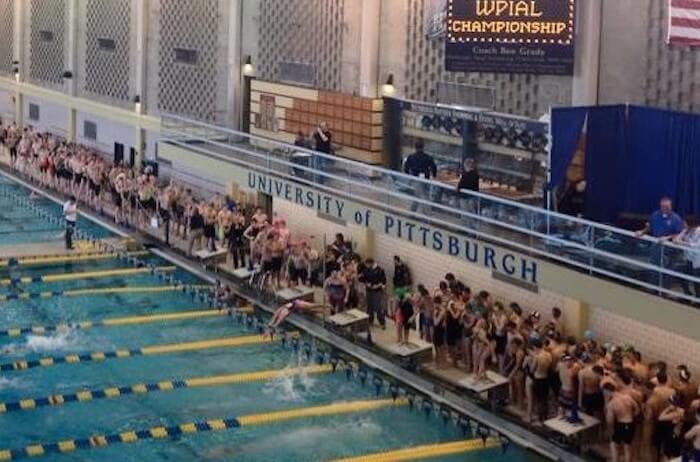Seeing the Light After A Traumatic VCD Attack

By Alexander Hardwick, Swimming World College Intern
The long yellow bus pulls up to the pool, jam-packed with swimmers in uniform warm-ups, who have been training morning and night, with hopes to touch the wall first. At the forefront of their minds are their goals of advancing to state, medaling, and attempting to score every precious point to aid their team in pursuit of the coveted team title.
You look down at your high school swim cap in your hands, knowing that you don’t swim for the interesting artwork displayed on either side, but for the teammates that will wear the same cap.
Districts are a high school meet filled with emotion, underdog swims, intense team battles and exceeded expectations. As a swimmer, I remember districts as the meet with most intense sense of team pride I had ever felt. As our crew marched into the pool area with bleach-stained mohawks we were one unit.
Plan Thwarted
In some cases, the meet can go the exact opposite direction of what you have been visualizing for months beforehand. That is exactly what happened my senior year.
My senior year district meet is known as District 7 in the Pennsylvania Interscholastic Athletic Association (PIAA). The year prior, I had won both the 100 and 200 yard freestyle races, and finished in the top 8 at the state meet.
Entering the district meet, I was the fastest swimmer in the 200 freestyle with a personal best of 1:39 from the previous year’s state final. Stepping up onto the block, my heart was pounding out of my chest, but the theme of our team’s district meet was swimming for your team above yourself.
As I dove into the icy water, I began my pursuit of defending the district title. But halfway back after the first 50, I couldn’t breathe. It wasn’t until the 75 that I began to panic, slowly falling off pace, but still among the leaders.
My mind was racing knowing that I needed to finish for the team and advance to state meet to achieve my personal goals. Flipping at the 150 mark everything went dark, and I floated to the water’s surface on my back. The lifeguards came over and helped me out of the pool. My race had ended in a way I never once visualized.
Former Upper Saint Clair high school coach and current Mount Lebanon High School coach Tom Donati recalled the moment.
“Having formerly been his coach, I was nervous for him. The one thing I never will forget is the eerie feeling when a whoosh of silence went over the crowd.”
I had never been diagnosed with asthma or any other respiratory disorder, so my coaches and teammates were concerned for my health first foremost.
“For Alex to stop- I was in disbelief that it happened,” my teammate Marty Bacik, a senior at Upper Saint Clair said.
A Diagnosis
Months after the incident, asthma was ruled out by doctors, and I found out that the condition I had was vocal cord dysfunction.
Vocal cord dysfunction (VCD) is a respiratory dysfunction where the vocal cords close prematurely, and partially or fully obstruct airflow. The condition is found in athletes and performers who are high achievers with heavy expectations.
You cannot cure VCD with an inhaler. It requires therapy. During therapy, athletes and performers learn ways to relax during an attack, and learn breathing techniques which are abdominal driven, rather than shoulder driven.
Breathing Easy
After my VCD attack in the 200 freestyle, I came back to anchor a new district record-setting 200 freestyle relay. I credit it all to my teammates and parents for their unparalleled support in my time of need. They were there during my darkest hour of swimming, and I am grateful.
Today I have learned how to deal with VCD and used that district meet as a learning experience. The most important part of swimming are the people who surround you. When the unexpected happens, they always have your back.
The experience taught me that every race, regardless of level, is a learning opportunity. I would never have known I had VCD if it weren’t for that meet, and today writing this piece with my two NCAA trophy mementos behind my laptop, I know that although that meet was dark, the future is always bright.





Thank you for shedding light on this topic.
Yes thank you my daughter is a swimmer and has been in treatment for over a year 🙁 very very hard to cope with
I have VCD as well! I was actually diagnosed with asthma and used an inhaler for a long time until I realized (after passing out during a practice) it wasn’t doing enough to help my breathing. After going on several different steroids, acid reflux and allergy medications, I was finally diagnosed with VCD last year. I’ve been told the only cure is breathing therapy or going to see a counselor. So far neither of these have helped my breathing. At this point, I’ve had to completely cut out all distance and mid-distance events and solely focus on the sprints because I start to experience tunnel vision or extreme dizziness and severe leg cramping as the lack of oxygen builds up. I’m curious though: what do you do to open up your breathing and battle VCD?
Erin,
I went to a speech pathologist after being diagnosed with VCD to deal with my vocal cords shutting due to an increase in stress/ high stakes performance. I learned belly breathing versus shoulder breathing, ways to massage my vocal cords, and overall body relaxation techniques. It was not an easy fixer; I also never really felt like it was the exercises that just cured my vocal cord dysfunction.
After my first episode that happened at the WPIAL Championship meet; I would have attacks in the 50 & 100 Freestyle as well. I found that my mental relaxation was my key to combating VCD.
In college now, I always stick to a routine before I get on the blocks to race. I do a couple of simple exercises, (4 deep belly breaths, a couple shoulder rolls, rubbing my throat a few times, and then take four more deep belly breaths)and stick to a pre-race routine.
I have found the routine keeps VCD out of my mind (which I think is HUGE) and I get on the block and compete. I think the thought of what has happened in the past has a crippling experience on my performance. So I prepare the best I can before the event, and when I get on the block the only thought in my mind is to win.
I hope this helps a little!
That’s encouraging! I’ve seen speech pathologists and done vocal therapy before but I still need to work on transferring those skills into meet prep. It’s tough since there’s no real “cure” for it, like you said.
Erin-
I have VCD as well, and went to multiple speech therapists and tried different techniques. For me personally they did not work at all, and I still struggled on a daily basis to even get through warmups. What ended up helping me the most was actually voice lessons! I am not a singer by any means, so all of my classes were focused on the proper breathing techniques to open my airways. I have also learned what my triggers to having a VCD attack are and tried my best to eliminate them. I have acid reflux which causes vocal cords to constrict to prevent the acid from coming higher up in the throat, so I went on medication for that. Tight neck and shoulder muscles also are a trigger for me, so I try to keep everything stretched out as best as possible. Your triggers might not necessarily be the same as mine, but I hope this helped anyways!
That’s really helpful! I’ve been working on keeping a training journal to see what my triggers are as well but I will definitely look into that more to get to the bottom of it. Thanks!
Cara Mendapatkan Uang Ratusan Ribu Perhari dengan Mudah
Sebuah cara baru, sederhana dan terpercaya yang akan memberikan Anda penghasilan melimpah dari internet.
Siapapun Anda, mulai sekarang bukan hal yang sulit lagi untuk Mendapatkan Uang Ratusan Ribu Perhari dengan Mudah
Caranya gampang sekali Klik disini ==>> http:/mesinvirtual+com/?id=Kesuksesaan
NB: Ganti Tanda +(plus) Dengan Tanda .(Titik/dot)
FB: Taufan Almaliq
SALAM SUKSES SELALU
Dapakan uang ratusan ribu perhari dengan sangat mudah
Sekarang gilIiran anda membuktikannya sendiri�
two members of our LSC w/ the diagnosis. I get it.
Dirk!!!
Interesting. I see many patients with VCD and it is a difficult, often misdiagnosed condition in competitive athletes
Cyndy Bowman Odenwald, the hallmarks of a VCD attack are tightness in the throat or upper chest and difficulty getting air in, sometimes accompanied by a noise or wheezing on inhalation. This experience is different for each person, but can be accompanied by tingling sensation, racing heart, feeling panicked, coughing or throat clearing, seeing stars,etc. Research estimates that about 50% of people with VCD have an underlying asthma, but in 50% it occurs alone. It is often mistaken for asthma.
VCD commonly occurs in competitive athletes, but occurs in all sports. Speech-Language Pathologists who specialize in voice disorders treat VCD, but the diagnosis is made by an ENT or Pulmonologist. I am a Speech Pathologist and my treatment approach is to teach patients to manage their symptoms with breathing strategies to prevent the VCD symptoms and also rescue strategies to get their breathing under control if it occurs.
Let me know if you have any more questions!
I would encourage athletes struggling with VCD to seek out biofeedback practitioners who do respiratory biofeedback. I have had success helping people through this approach. A good resource for finding practitioners is http://www.BCIA.org.
Sandra ????
Missing swimme
Wow! Thanks for the lesson!
Sandra Erichsen Cole
Belinda Cambre Van Hoogstraten
Interesting, I bel9ng to a running group – on FB a mother asked if anyone could help her figure why her daughter can’t breathe when she runs ( she ran cross contry) as they were getting no answers …
Interesting, I bel9ng to a running group – on FB a mother asked if anyone could help her figure why her daughter can’t breathe when she runs ( she ran cross contry) as they were getting no answers …
Jenny, if you find out anything more about this kind of thing, please share with me?
also read on cold uticaria (Brennen was diagnosed a year ago) and the other uticaria’s. These are hive reactions however, which can close throat. I b elieve hives will always be present/with ithching, but do not know if there are some instances in which they are not present.